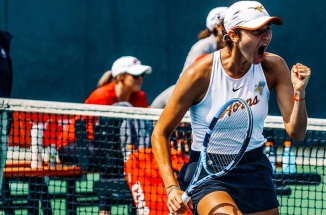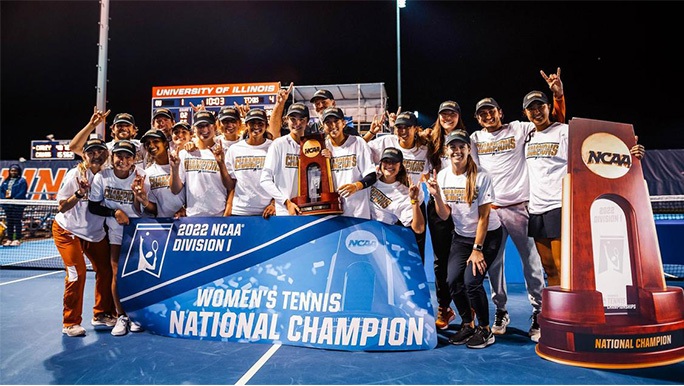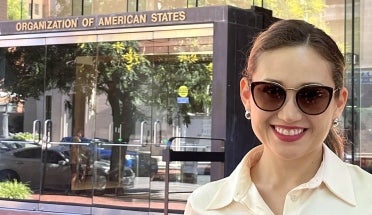
From Ukraine to Austin: Tennis Champion Zeynalova Overcomes and Inspires
- Apr 16, 2024
- International Student and Scholar Services
- by Alex Briseño
[Editor’s Note: This is the latest installment of Texas Global's international student-athlete series, which celebrates Longhorn competitors from around the world and shares the stories of their journeys to the Forty Acres. Please note that this article contains depictions of experiences with disordered eating and recovery.]
Sabina Zeynalova, a junior on the women’s tennis team, often reflects on 2022, her freshman year at The University of Texas at Austin. The season concluded with a national championship, including a blistering 23-1 singles record for the native of Kyiv, Ukraine — that’s hardly what first comes to her mind about the year, though.
On February 24, 2022, while Zeynalova was preparing for an early-season match against Stanford in Palo Alto, California, Russia launched an invasion of Ukraine.
Zeynalova went on to play and win the following day. What her stunning record won’t reveal is the toll it took on her to compete at the highest collegiate level in a new country while her family and friends in Kyiv were in peril more than 6,000 miles away.

“When I think about my freshman season, I realize that’s when I learned to appreciate the things in life that are important: My family means the world to me,” Zeynalova said. “Nothing else matters when your family is in danger.”
She added, "There was no reason to worry about a grade in a class or losing a match on a tennis court. It’s negligible compared to what I was worrying about: Trying to figure out if my parents could safely drive from Kyiv to Poland.”
This came at the beginning of a long tennis season in pursuit of a national championship, accompanied by unsustainable coping mechanisms that ultimately left Zeynalova searching for healthier solutions and some semblance of peace.
Searching for Solutions
Zeynalova doesn’t recall immediately feeling fear, anger or even sadness when the war started. Dissociating was her initial response to the resulting anxiety and stress. It wasn’t until her sophomore year that she realized this wasn't a viable long-term solution.
“When it hit me, it hit me so hard, and a lot of people already got used to [the war] by that time,” Zeynalova said. “My mother would say, ‘Sabi, it’s been nine months; we’re OK.' I was just realizing how bad it was, and I couldn’t get used to it. Then there was the stress it put my physical body through.”
Zeynalova thought the best mentality forward was to power through, and she made a plan: She would outwork every single opponent. If a match lasted five hours, she was ready to win it.

“I thought, if I give everything I have on the court, if I torture myself in the gym and practice, then it will pay off,” Zeynalova said. “I decided: I am going to be a robot. I am going to be just an absolute killer on the court.”
That, too, was not a feasible approach. It isn't difficult for Zeynalova to remember the exhaustion of her second year — and the stress fracture in her back, which only complicated things.
“I was so beat up,” she said. “I was so done with tennis. I was just so burnt out.”
Love at First Swing
Zeynalova had fallen in love with the sport the moment she picked up a racquet.
“I was in a lot of sports growing up,” Zeynalova said. “But even if I won, for example, my ballroom dance competition, I only got a medal. That was not good enough for me as a kid, so I wondered, ‘What sport would get me a trophy?’ I knew tennis was going to get me that, for sure.”
Just a few years later, by the time she was nine years old, the sport had her full commitment.
“I still loved it as much as I did when I started a few years earlier, and I was pretty good, so I knew I wanted to pursue it,” she said. “I wasn’t amazing when I was young, but I was solid, and I wanted this. I was a hard worker, even when I was nine years old, and I just stuck with it.”
Zeynalova dominated as a teenager, winning two International Tennis Federation (ITF) junior singles championships and four ITF junior doubles titles en route to becoming the No. 1 player in Ukraine’s Under-18 rankings.

Playing professionally is what every coach pushes for in Ukraine, she explained, which is exactly what her sights were set on.
“Every coach you work with will tell you that you’re going pro by the time you are 16 or 17 years old,” Zeynalova said. “You are told that you don’t have to worry about school; you can do homeschooling, but it doesn’t matter.”
That's why Zeynalova initially had no intention of playing college tennis or coming to the United States. The wear and tear of training from an early age began to add up, though, until lingering injuries kept Zeynalova off the court, requiring her to redraw the blueprint for the career she’d envisioned.
“Mom finally said, ‘OK, your plan to go pro sounds good, but in reality, you are injured. You’re likely not going to play much beyond the age of 35, so what are your other options?’ ” Zeynalova said. “Her response was to reach out to American universities.”
One Call Changed Everything
Despite an initial reluctance, all it took was one meeting with Howard Joffe, head coach of the women’s tennis team, for Zeynalova to reconsider her future.
“Just one call with my head coach changed everything,” Zeynalova said. “I’ve never had a doubt that he has my best interest in mind. This was just so evident from the first time we spoke.”

The main goal for Joffe, who is from Johannesburg, South Africa, was to learn as much as he could about Zeynalova during that initial meeting so that he could gauge two things: Whether Zeynalova would be a good fit on a strong team, and if she would have the ability to develop at Texas. Joffe, too, found his answer after just one call.
“Our initial video meeting was a marathon, but during that time it became clear to me that Sabina was resourced in some really fabulous ways as a person. She was really smart, articulate, engaging, clear on her intention and extremely hungry,” Joffe said. “I was sold that this was someone who would flourish at Texas. The past three years have been evidence of this.”
'I Realized I Needed Help'
Finding the right coaching staff, resources and environment is key for every athlete, but it proved crucial for Zeynalova during her sophomore year as she faced burnout and stress fractures.
Zeynalova also publicly opened up for the first time, in October 2022, about her relationship with food, her body and an eating disorder.
“Eating Disorder numbs you. It makes your anxious brain stop worrying. It keeps you safe from thinking you’re not a good enough athlete, not pretty or smart enough, that there’s war in your country,” Zeynalova wrote in the post. “... After suffering for almost a year, damaging my reproductive system, experiencing anxiety attacks, and feeling hopelessness – I realized I needed help.”
She continued: “I wouldn’t be able to start my recovery process without my wonderful mom and the people who took care of me and supported me in the darkest days of my life.”

Zeynalova arrived at the decision to make the announcement publicly after growing tired of receiving compliments on her physical appearance.
“That’s not how I really look. That’s days of starvation — people just didn’t know,” Zeynalova said. "I wasn’t good, and I wasn’t fit. I was sick. At one point, I realized I had to let it out. I also just wanted people to know that it is possible. You can take control of it and you can choose yourself over and over again, even when it’s hard.”
Choosing Recovery
Zeynalova considers it a blessing that she was at UT Austin during this time. She started attending frequent therapy sessions and met daily with dietitians who specialize in working with student athletes with eating disorders.
“They tried to incorporate meal plans, which failed, but eventually it was something I admitted that I needed. It was such a process. It was brick by brick,” she said. “It took about six months for me to stop lying to my therapist and dietitian, which is normal. It starts with denial, not wanting to change, so you lie. As did I.”
She added, “Then, incrementally, I started telling more truths.”
As Zeynalova slowly built trust with her team of therapists and nutritionists, they worked on reaching the point where she finds herself now: Comfortable with her body and the food she is eating. She’s developed an expanded level of forgiveness and kindness toward herself, her sleep has drastically improved — and, notably, she’s happy.

“That was a tough, tough journey. But now I am the happiest I’ve ever been with myself.”
Zeynalova added, “I’ve gotten much better at giving myself rest, being kind to myself and understanding that I don’t need to be perfect all the time. It actually gives me more energy to devote to tennis, my studies or even exploring new things.”
That’s not to say Zeynalova is free of bad days. But now, she identifies it as such — just one of those days — knowing she will wake up with a clean slate and confidence rooted in the work she put into healing.
‘Same Goal, Different Mentality’
Zeynalova posts a motto on Instagram before the start of every tennis season. At the start of her sophomore season, after winning the national championship as a freshman, she posted “same goal, same mentality.” This time, for her junior year campaign, she wrote: “Same goal, different mentality.”

A new understanding of balance means she no longer primarily relies on mental toughness to find success on the court.
“I hate to lose. My desire to win will always be there. But, I am learning that I can trust my body this year,” Zeynalova said. “I can actually allow myself to go out there and have fun."
Besides Zeynalova’s new mentality — now evident in her strengthened mind-body connection and guilt-free rest days — she has also gained clarity about a dream she would like to pursue off the court. As a psychology major, Zeynalova wishes to return to Ukraine after she retires from tennis to work with people experiencing PTSD.
“The generation that is growing up in Ukraine are experiencing constant bombings, air sirens and they see death every day,” Zeynalova said. “It’s something that is going to change the course of Ukraine, because the amount of people needing mental health care will be significant. It’s going to need a lot of attention, and it is something that can be my purpose in life aside from tennis and other personal achievements.”
While Zeynalova is applying a different approach and mindset to her junior season, one thing remains the same: the blue and yellow ribbon she wears for every match.
As for her team, Texas finished the regular season ranked in the Top 10 again with another national championship in view. Zeynalova, who was named Big 12 Player of the Week at the beginning of March, is currently No. 25 nationally in the Intercollegiate Tennis Association’s singles rankings.

“Sabina has really been the poster child for what our program does and what, more broadly, Texas athletics does,” Joffe said. “Sabina has grown each year as a person and a player, and now, in her junior year, she is one of the top players in all of college tennis. She is a stellar student, teammate and person.”
Zeynalova has also enjoyed a rekindled passion for tennis and life. It arrives in tandem with an acceptance of what this life has presented so far in the last three unpredictable years and of the next opportunity that awaits.
“What’s taking me further is facing life as it is, as it comes, embracing everything that happens while still being kind to myself,” Zeynalova said. “I am self-sufficient now. That’s something that I learned at UT. I’ve also learned that I am enough. It’s a kind of self-confidence I’ve never had before.”



